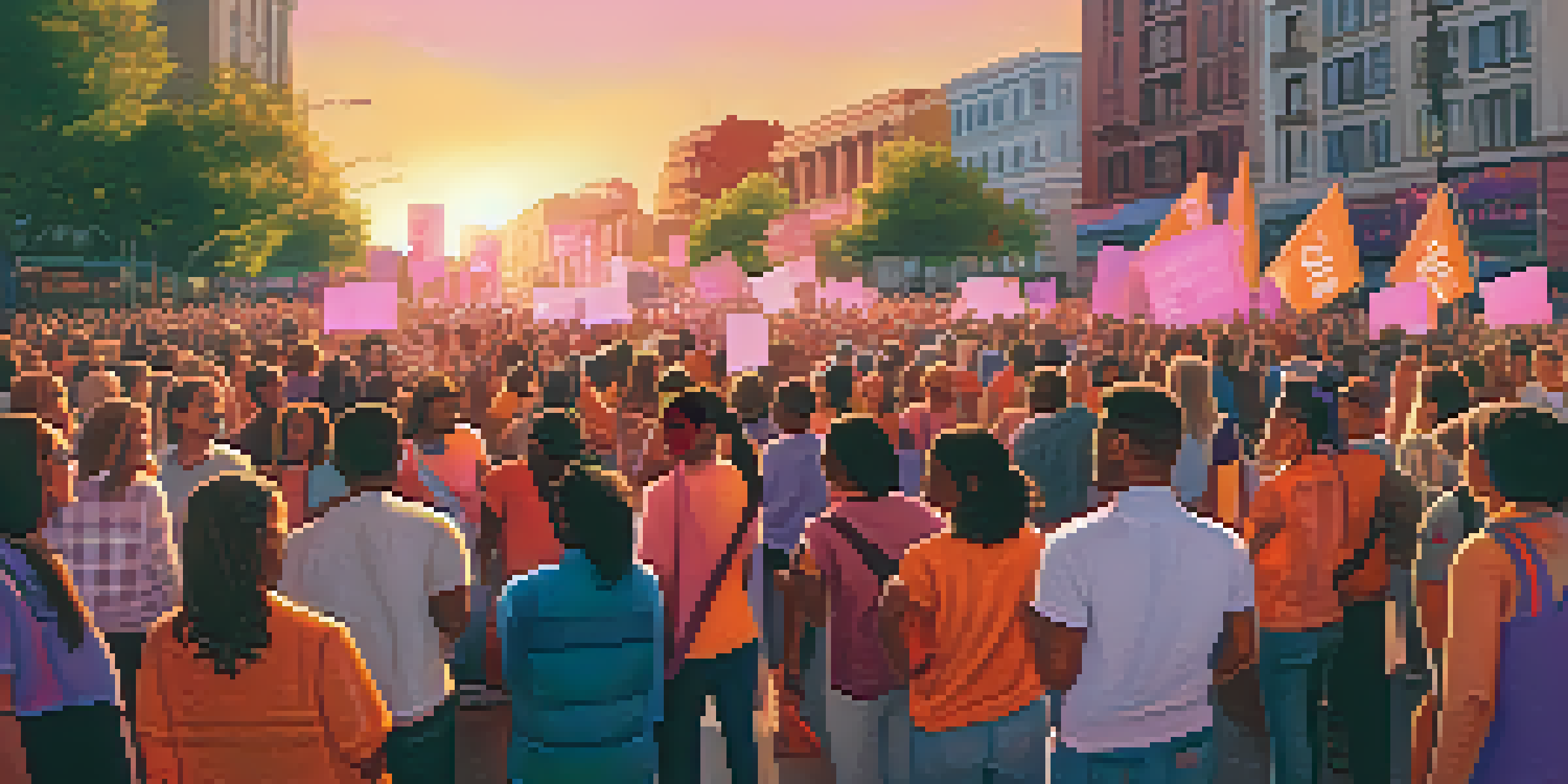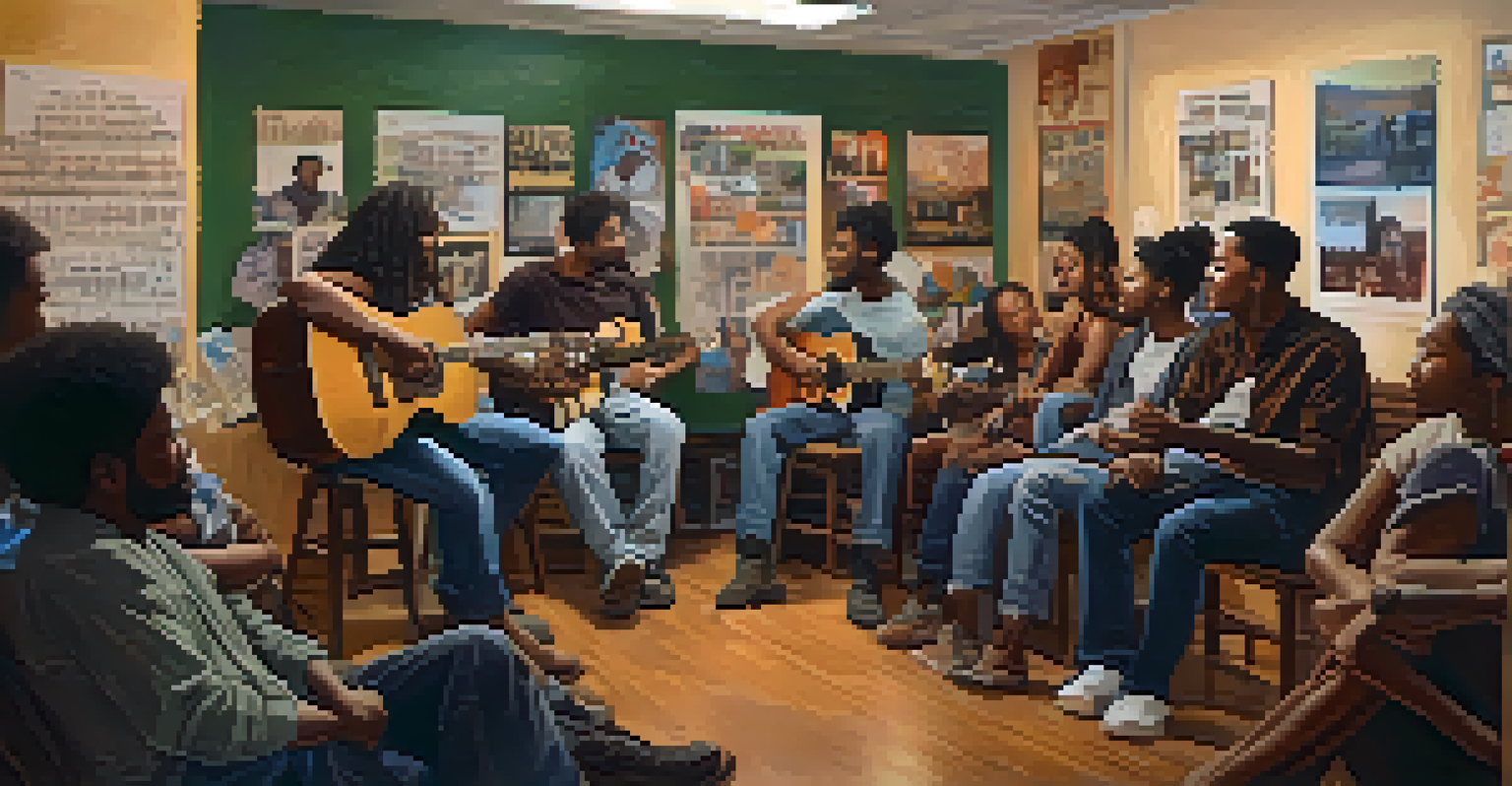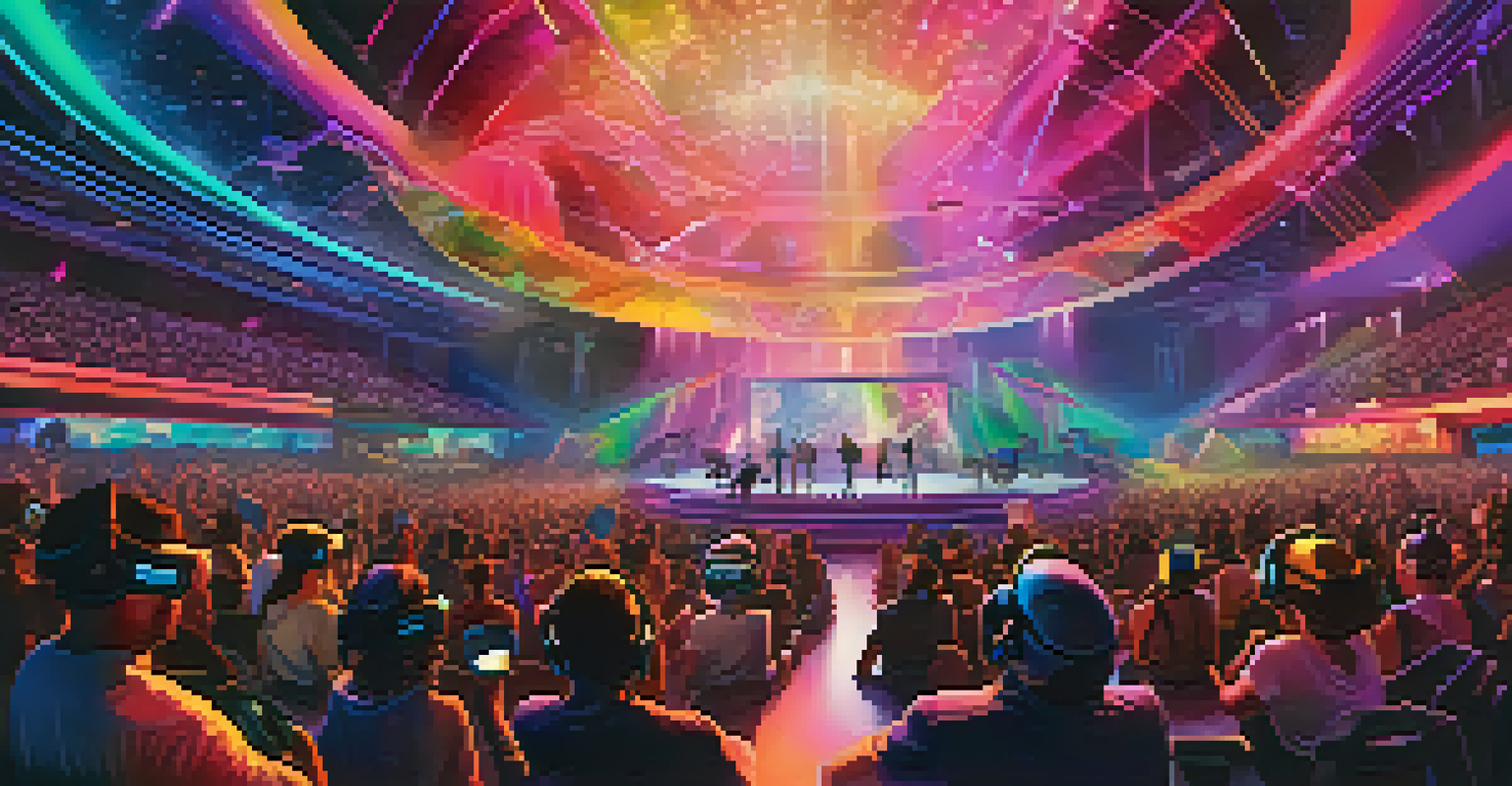Music as a Tool for Identity in Social Movements

Music's Emotional Power in Social Movements
Music has a remarkable ability to evoke emotions, making it a powerful tool in social movements. Songs can encapsulate feelings of hope, frustration, and resilience, serving as anthems for change. For instance, the Civil Rights Movement used songs like 'We Shall Overcome' to inspire unity and determination among activists.
Music is the shorthand of emotion.
When people gather to sing or listen to music, there's a sense of belonging that transcends individual experiences. This collective experience can strengthen group identity and solidarity, essential elements in any movement. The emotional resonance of music encourages participants to engage deeply with the cause.
Moreover, music can articulate complex social issues in ways that resonate with a broader audience. This makes it an effective medium for raising awareness and promoting social justice, as it encourages reflection and empathy among listeners.
Creating a Collective Identity Through Music
In social movements, music often serves as a rallying cry that fosters a shared identity among participants. When individuals sing together, they create an emotional bond that reinforces their common goals. For instance, during the anti-apartheid movement in South Africa, songs like 'Nkosi Sikelel' iAfrika' became symbols of resistance and hope.

This shared musical experience can help individuals feel less isolated in their struggles. By participating in group singing or listening to movement-related songs, people develop a sense of belonging to something larger than themselves. This collective identity is crucial for sustaining momentum in social movements.
Music Unites in Social Movements
Music fosters a collective identity among participants, creating emotional bonds that strengthen group solidarity.
Furthermore, music can help articulate the values and aspirations of a movement, making its message more relatable. By sharing songs that reflect their experiences and struggles, activists can communicate their vision for change in a way that resonates with others.
Music as a Form of Resistance
Throughout history, music has been a potent form of resistance against oppression. In many cases, artists have used their platforms to protest injustices and advocate for change. For example, Bob Marley’s 'Get Up, Stand Up' became an anthem for the fight against inequality and injustice in Jamaica and beyond.
The power of music is such that it can bring people together in a way that nothing else can.
This form of musical resistance not only raises awareness but also empowers individuals to take action. Songs can inspire people to stand up against injustices, offering them the courage to join protests and demonstrations. The act of singing or listening to these songs can serve as a reminder of their strength and solidarity.
Moreover, the ability of music to reach diverse audiences makes it a unique tool for social change. By transcending language barriers and cultural differences, music can unite people around a common cause, amplifying the message of resistance.
The Role of Lyrics in Social Movements
Lyrics play a crucial role in conveying the messages and emotions of social movements. They often reflect the struggles and aspirations of the people involved, making them relatable and impactful. For instance, the lyrics of 'Fight the Power' by Public Enemy encapsulate the frustrations of marginalized communities in America.
By sharing their stories through music, activists can connect with audiences on a personal level. This connection can spur individuals to reflect on their own experiences and engage more deeply with the movement. The power of lyrics lies in their ability to inspire and mobilize people towards collective action.
Lyrics Convey Powerful Messages
The lyrics of protest songs articulate struggles and aspirations, inspiring individuals to engage with social movements.
Additionally, the repetition of powerful lyrics can create a sense of familiarity and urgency. As these songs are sung and shared in protests, they become embedded in the movement's narrative, reinforcing its goals and values.
Music and Cultural Identity in Movements
Music often reflects the cultural identity of a group, allowing social movements to celebrate their heritage while advocating for change. Traditional songs can be reimagined to address contemporary issues, linking past struggles with present aspirations. For example, Indigenous movements often incorporate traditional music to assert their identity and rights.
This blending of culture and activism helps preserve cultural heritage while mobilizing support for social causes. It fosters pride among community members, reminding them of their shared history and the importance of their struggles. The incorporation of cultural music creates a unique narrative that resonates with both participants and supporters.
Moreover, music can be a bridge between different cultural groups within a movement. By embracing diverse musical influences, movements can foster inclusivity and unity, making the overall message more powerful and accessible.
Digital Platforms Amplifying Musical Activism
In today’s digital age, music can spread quickly and widely, making it a vital tool for social movements. Platforms like YouTube, Spotify, and social media allow activists to share music that resonates with their causes. This accessibility enables songs to reach audiences far beyond local communities, amplifying their impact.
Moreover, the viral nature of digital platforms means that songs can inspire action almost instantaneously. For instance, the 'This Is America' music video by Childish Gambino sparked discussions on gun violence and racism, illustrating the power of music to influence social discourse.
Digital Platforms Amplify Impact
In the digital age, music can quickly spread awareness and inspire action, making it a crucial tool for social change.
Additionally, these platforms allow for the creation of unique collaborations between artists and activists, further blurring the lines between entertainment and advocacy. This fusion not only promotes the movement but also gives artists a platform to express their support for social justice.
The Future of Music in Social Movements
As social movements evolve, the role of music will likely continue to adapt. New genres and forms of expression may emerge, reflecting the changing landscape of activism. The future may bring a fusion of traditional and contemporary styles, creating innovative soundtracks for social change.
Moreover, with the rise of technology, we can expect music to play an even more significant role in mobilizing communities. The integration of artificial intelligence and virtual reality could create immersive musical experiences that deepen engagement and connection among participants.

Ultimately, the enduring power of music in social movements lies in its ability to inspire, unite, and empower. As long as there are voices calling for change, music will remain an essential tool for expressing identity and advocating for social justice.